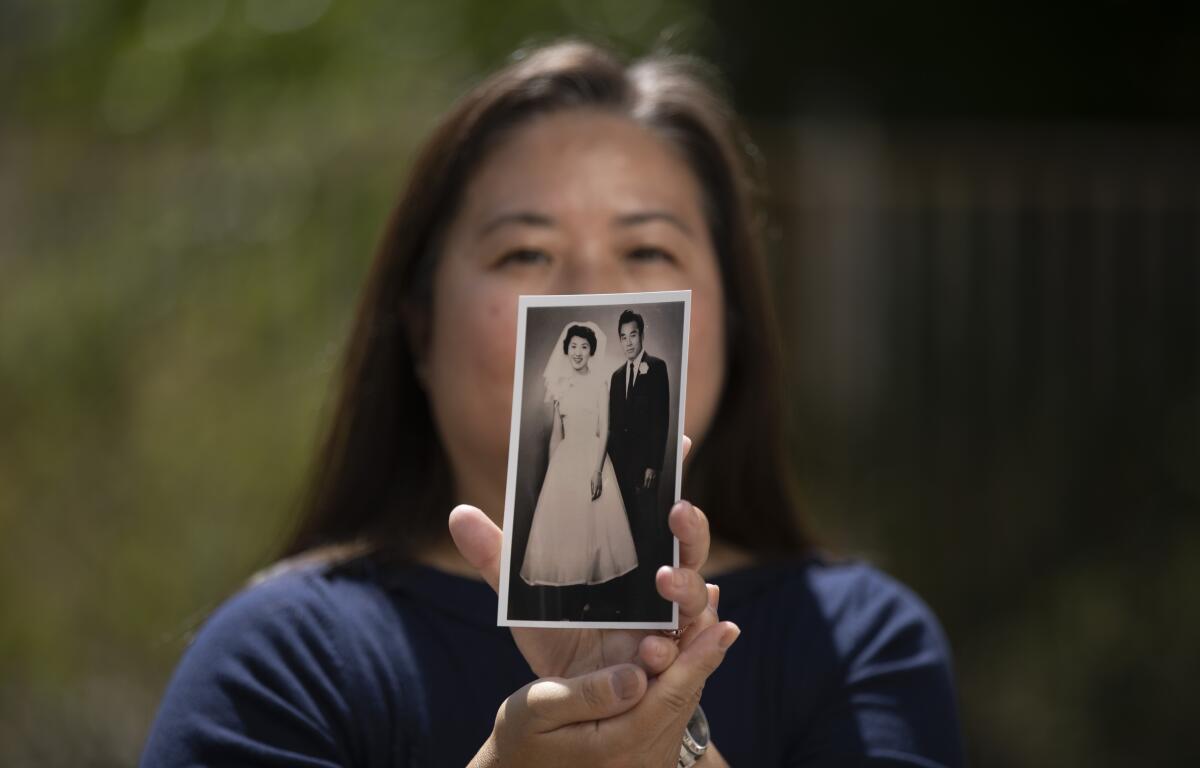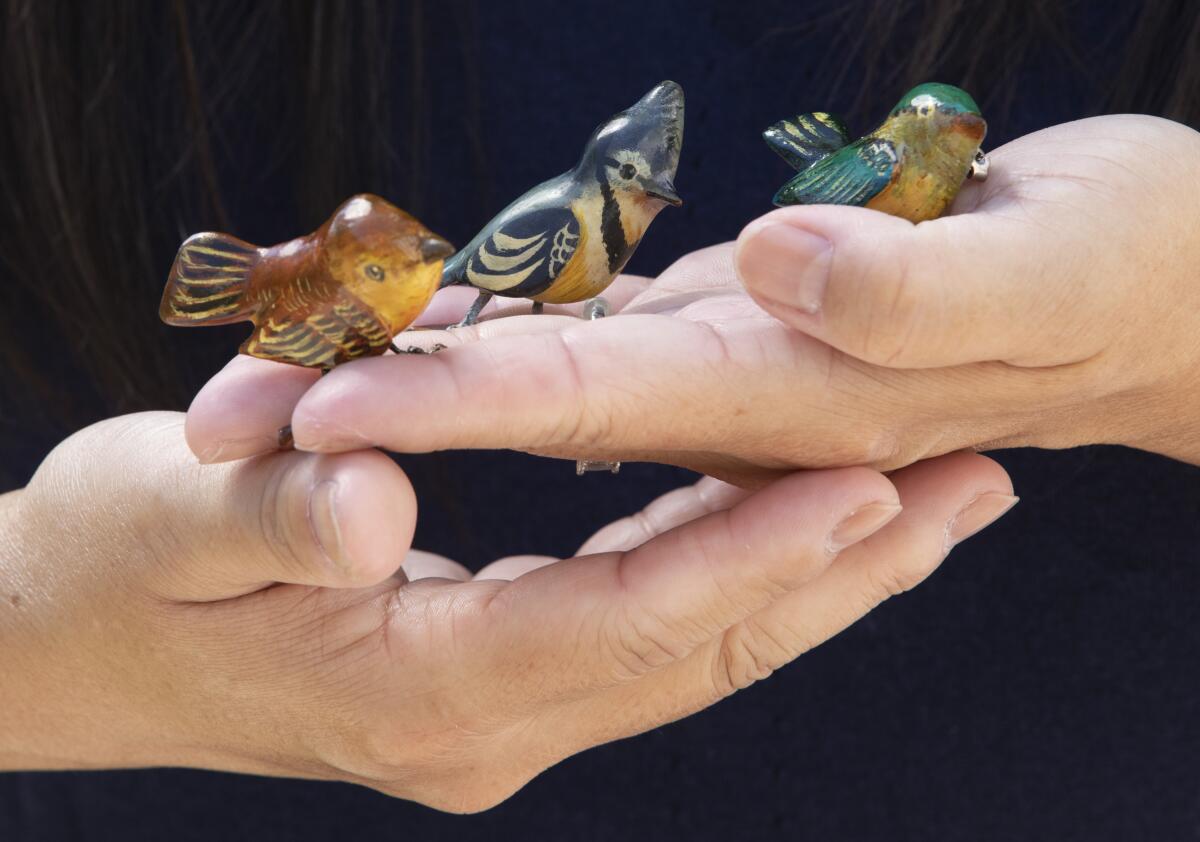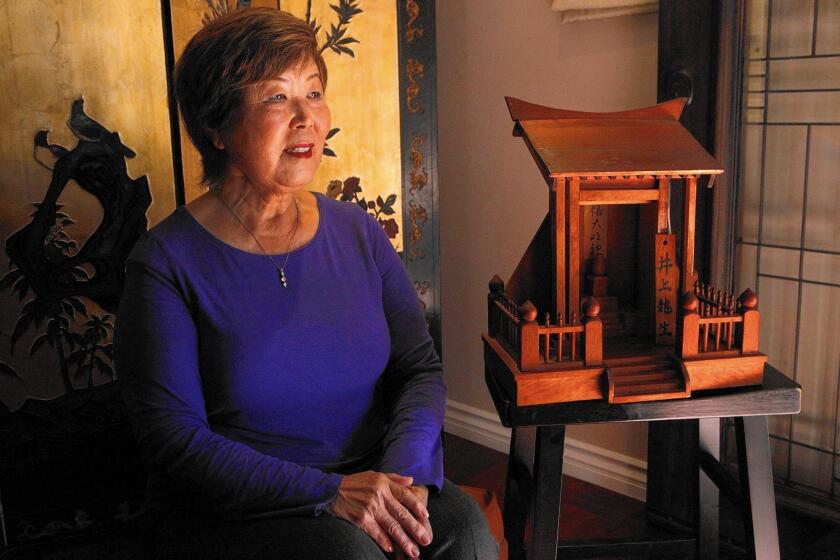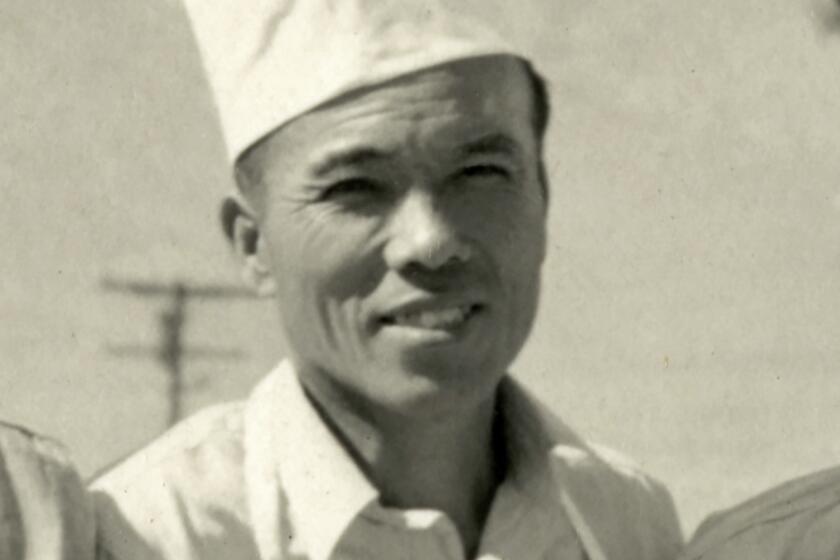She didn’t know about her father’s artwork from Manzanar until she saw it on EBay

- Share via
Lori Matsumura joked that she missed out on the art gene that runs in her family.
Her grandfather, Giichi, used watercolors to document life at the Manzanar War Relocation Center where he and his family were incarcerated during World War II. Her father, Masaru, created wooden bird pins there that she keeps at her home in Stevenson Ranch.
For the record:
6:05 p.m. April 8, 2021A previous version of this article misspelled Matsumura as Matsumara. It also incorrectly stated the bids for the sketches. The starting bid was around $50 and the closing bid was just over $480, not less than $70 and just more than $120, respectively.
“Whenever we would ask him to draw something, he was really good at it,” Matsumura said over the phone. “But we have no sketches that my dad ever did.”

So she was understandably stunned when she found out this week about an EBay auction of 20 pencil sketches that the seller claimed were from a Manzanar artist. The stark depictions of landscapes such as mountains, pine trees and Mt. Fuji seem a world away from the lonely prison camp at the eastern base of the Sierra Nevada.
Each was signed “Matsumura” in all-cap block letters. The starting bid was around $50.
“I don’t have the drawings in my hands, but it looks like my dad’s writing,” Lori said. “I was sad that they were trying to sell this artwork. No, it angered me.”
For decades, collectors have sought and sold similar artifacts from World War II-era Japanese American concentration camps: clothing, yearbooks, crafts, pottery, anything.
Activists have tried to stop such sales, arguing they’re little better than war profiteering off a persecuted minority during one of this country’s darkest chapters.
But the American capacity to monetize human suffering knows no lows. During a nationwide rise in anti-Asian hate, these items are hotter than ever.
Right now, EBay lists a 1945 high school yearbook from the Minidoka War Relocation Center in Idaho for $3,250. A woman’s shirt embroidered with the autographs of detainees from the Poston concentration camp in Arizona goes for $7,500. A booklet that documented life at the Fresno Assembly Center starts at $10,000 — “This is one of those items that should be in a MUSEUM,” the listing boasts.
“To see these objects for sale, which have been saved from a time of great suffering and loss, is a gut punch,” said Nancy Ukai, the project director of 50 Objects, a digital history project that tells the stories behind Japanese American artifacts.
“They’re like puzzle pieces which have been thrown all over, and here we are trying to pick them up and make sense of our history,” she said.
“If we allow others to profit off injustice, it speaks to the kind of society that we are condoning,” said Bruce Embrey, co-chair of the Manzanar Committee, which organizes annual pilgrimages to the national historic site every April.
“Together, these artifacts make this extraordinary cloth, this fabric of injustice,” Japanese American National Museum President Ann Burroughs said. “If they go into private collections, do [the owners] have the capacity to preserve them? Are they going to share them? It’s not just to tell the story, but also so it doesn’t happen again.”
Ukai, Embrey and Burroughs joined nearly 60 Japanese American groups that sent EBay a letter demanding the company halt bids for the Matsumura drawings.
“By treating such objects as art to be sold and establishing a benchmark price,” the letter read, “you encourage the perception that our history is just another commodity.”
After meeting with activists, EBay complied with the request just hours before the auction closed, with the price having just topped $480.
Spokesperson Parmita Choudhury said the auction violated company policy that prohibits “the sale of items from government or protected land.”
“We are continuing to review this issue and will take appropriate action,” she said, even as EBay still listed dozens of items from Manzanar and other such camps.
The seller, who declined to disclose their identity, at first defied requests to withdraw the listing. After EBay deleted it, the seller told me that company officials “apologize for listing this item, because I had no idea that I was violating EBay’s policy.”
The mea culpa brought Matsumura little comfort. She’s mulling over her options about how to try to obtain her father’s Manzanar sketches.
“I know people try to sell artifacts, but I never thought it would ever be from my immediate family,” the 50-year-old said. “Now, I’m afraid I could lose those forever.”
::
The sale of artifacts from Japanese American concentration camps has troubled the community for decades.
Embrey, whose mother was incarcerated at Manzanar and helped start pilgrimages there, says he receives calls from people wanting to pawn off items on him “every year without fail.”
“They’ll say, ‘My parents once wandered around Manzanar and found some trinkets, and I want to return it to the rightful owner,’” said the 63-year-old Los Angeles resident. “And they’ll say, ‘Oh, and I don’t want any money.’ Sure.”
Embrey always calmly explains to callers that he feels it’s unethical to “profit off of our suffering” and suggests they donate those mementos to a museum, community center or university archive.
“I give them all kinds of options that do not involve money,” he said with a bitter laugh. “I never hear back from them.”
The issue received national attention in 2015 when Ukai and others spearheaded a campaign to stop an auction house from selling more than 400 artworks and craft pieces created in American concentration camps.
Nancy Oda’s parents had an expression whenever she brought up her family’s imprisonment behind barbed wire during World War II.
“Selling them solidifies and legitimates the selling of our trauma,” she said. “We don’t want these kinds of sales and commodifications to normalize the history and put it in the category of, ‘Oh, they were sitting in camp making art.’ That’s the wrong interpretation, and these sales distort the truth.”
The Japanese American National Museum was able to acquire the collection in its entirety, displaying selections at their Little Tokyo facility and lending items to exhibits across the country.
“We know so little about the provenance of each item, and it’s been an extraordinary opportunity to crowdsource,” Burroughs said. “Survivors or descendants see them, and it sparks conversations. It’s a sense of collective ownership.”
Matsumura sighed when I described current EBay listings. “I’m so glad that these [Japanese American] organizations want to block things like this,” she said. “It’s the right thing to do.”
It’s been a couple of “crazy” years for her family.
In 2019, her father passed away at 94.
Months later, hikers found the remains of her grandfather, Giichi, who died during a blizzard on a remote mountain near Manzanar in 1945.
Skeletal remains of Japanese American interned at Manzanar found in mountains
After being released from Manzanar, her father returned to Santa Monica with his widowed mother and three siblings and became a gardener.
He talked little about his wartime experience. The first time his daughter visited Manzanar was when she went there to submit DNA to the Inyo County Sheriff’s Office to be matched with Giichi’s remains.
Now, the case of the Matsumura drawings might set a precedent for EBay to permanently ban future sales of Japanese American incarceration artifacts.
“I understand [art dealers] need to make a living,” Matsumura said. “But not on this. Not on my dad’s drawings.”
More to Read
Sign up for Essential California
The most important California stories and recommendations in your inbox every morning.
You may occasionally receive promotional content from the Los Angeles Times.
















